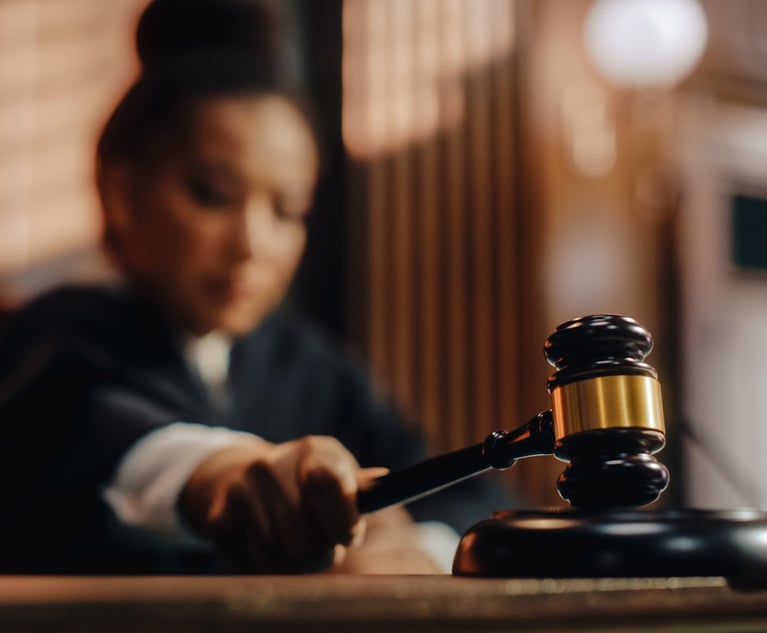 Credit: 5m3photos/Adobe Stock
Credit: 5m3photos/Adobe StockJudge Leaves Statute of Limitations Question in Injury Crash Suit for a Jury
Denying attempts to dismiss a loss of consortium claim, the court determined the question of when the spouse of a man involved in a tractor-trailer collision discovered her injury should be decided by a jury.
November 12, 2024 at 04:45 PM
4 minute read
A personal injury suit against a truck driver and food transportation company is moving forward, with a federal judge in Pennsylvania leaving the question of whether a loss of consortium claim is time barred for a jury to decide.
In a Nov. 8 decision, U.S. District Judge Malachy E. Mannion of the Middle District of Pennsylvania denied a motion to dismiss filed by a tractor-trailer driver, food transportation company, and other related parties.
In Thomas v. Orozco-Pineda, the plaintiffs accused defendant Jorge Orozco-Pineda, an employee of Food Haulers, of negligently operating a tractor-trailer, which collided with a vehicle occupied by plaintiffs Randolph Thomas and Bridgette Palmatierre in February 2022. In addition to negligence and respondeat superior liability claims, the plaintiffs filed an amended complaint adding Thomas' spouse, Diane Thomas, who brought a loss of consortium claim in September.
The defendants moved to dismiss the claim, arguing it was time barred as it was added after the statute of limitations had run out.
Mannion sided with the plaintiffs.
"Defendants may seek summary judgment on Diane Thomas’ loss of consortium claim if the facts are so clear that she should have known more than two years prior to the date the amended complaint was filed about her injuries. Otherwise, the question of when she discovered her injury must be left to the jury," Mannion said. "But in any event, it is premature to dismiss this claim without the benefit of any fact discovery, let alone clear facts to show when the alleged loss of consortium occurred. Accordingly, defendants' motion to dismiss will be denied as to plaintiff Diane Thomas' loss of consortium claim."
In support of their argument the defendants cited the Pennsylvania Superior Court's 2015 ruling in Sullivan v. Haywood, where the court "recognized that there is a two-year statute of limitations period for loss of consortium claims in Pennsylvania and granted Defendants summary judgment on a loss of consortium claim added via amended complaint more than two years after Plaintiff become aware of the alleged loss of consortium."
The plaintiffs argued the defendants failed to show when Diane Thomas, a resident of New York, became aware of her injuries, or why Pennsylvania law applies. As to the applicable law, Mannion determined that as the forum state, Pennsylvania's statute of limitations applies. According to the court, the state's discovery rule holds that the running of the applicable statute of limitations begins when the plaintiff knows or reasonably should know they had been injured, and that their injury was caused by another party's conduct.
"Only where the facts are so clear that reasonable minds could not differ may a court determine as a matter of law at the summary judgment stage, the point at which a party should have been aware of her injury and its cause and thereby fix the commencement date of the limited period," Mannion said. "Here defendants ask the court to dismiss plaintiff’s loss of consortium claim before summary judgment despite the fact that in most cases even summary judgment is inappropriate on such claims under the discovery rule."
As to the defendants' argument that there weren't any factual disputes to resolve in order to dismiss the claims, Mannion concluded that "factual disputes or the lack thereof are also issues to be determined on a motion for summary judgment not a motion to dismiss."
The defendants also argued the plaintiffs' punitive damages claim was insufficiently pleaded. The court similarly concluded the motion to dismiss was premature at the current stage, finding that while a defendant can "move to dismiss a complaint or parts of a complaint before or after filing an answer," their motion to dismiss wasn't appropriate. Mannion noted that courts routinely deny requests to dismiss punitive damages in motor vehicle accident cases at the outset of litigation.
"As a general rule, courts have deemed motions to dismiss punitive damages claims as premature and inappropriate where, as here, the complaint alleges reckless conduct," Mannion said. "Moreover, because the question of whether punitive damages are proper often turns on the defendant’s state of mind, this question frequently cannot be resolved on the pleadings alone but must wait till the development of a full factual record at trial."
The plaintiffs' attorney, David S. Sweetman, of The Mattioli Law Firm in Scranton, and the defendants' attorney, David A. Yavil of Lewis Brisbois Bisgaard & Smith, in Wayne, did not immediately respond to requests for comment.
NOT FOR REPRINT
© 2025 ALM Global, LLC, All Rights Reserved. Request academic re-use from www.copyright.com. All other uses, submit a request to [email protected]. For more information visit Asset & Logo Licensing.
You Might Like
View All
With New Civil Jury Selection Rule, Litigants Should Carefully Weigh Waiver Risks
6 minute read
Litigating the Written Word: Parol Evidence Rule and the Gist of the Action Doctrine in Fraud Claims
6 minute read
Phila. Court System Pushed to Adapt as Justices Greenlight Changes to Pa.'s Civil Jury Selection Rules
5 minute read
Pa. Appeals Court: Trial Judge Dismissed Med Mal Claims Without Giving Plaintiffs Proper Time to Fight Back
4 minute readTrending Stories
- 1Reviewing Judge Merchan's Unconditional Discharge
- 2With New Civil Jury Selection Rule, Litigants Should Carefully Weigh Waiver Risks
- 3Young Lawyers Become Old(er) Lawyers
- 4Caught In the In Between: A Legal Roadmap for the Sandwich Generation
- 5Top 10 Developments, Lessons, and Reminders of 2024
Who Got The Work
J. Brugh Lower of Gibbons has entered an appearance for industrial equipment supplier Devco Corporation in a pending trademark infringement lawsuit. The suit, accusing the defendant of selling knock-off Graco products, was filed Dec. 18 in New Jersey District Court by Rivkin Radler on behalf of Graco Inc. and Graco Minnesota. The case, assigned to U.S. District Judge Zahid N. Quraishi, is 3:24-cv-11294, Graco Inc. et al v. Devco Corporation.
Who Got The Work
Rebecca Maller-Stein and Kent A. Yalowitz of Arnold & Porter Kaye Scholer have entered their appearances for Hanaco Venture Capital and its executives, Lior Prosor and David Frankel, in a pending securities lawsuit. The action, filed on Dec. 24 in New York Southern District Court by Zell, Aron & Co. on behalf of Goldeneye Advisors, accuses the defendants of negligently and fraudulently managing the plaintiff's $1 million investment. The case, assigned to U.S. District Judge Vernon S. Broderick, is 1:24-cv-09918, Goldeneye Advisors, LLC v. Hanaco Venture Capital, Ltd. et al.
Who Got The Work
Attorneys from A&O Shearman has stepped in as defense counsel for Toronto-Dominion Bank and other defendants in a pending securities class action. The suit, filed Dec. 11 in New York Southern District Court by Bleichmar Fonti & Auld, accuses the defendants of concealing the bank's 'pervasive' deficiencies in regards to its compliance with the Bank Secrecy Act and the quality of its anti-money laundering controls. The case, assigned to U.S. District Judge Arun Subramanian, is 1:24-cv-09445, Gonzalez v. The Toronto-Dominion Bank et al.
Who Got The Work
Crown Castle International, a Pennsylvania company providing shared communications infrastructure, has turned to Luke D. Wolf of Gordon Rees Scully Mansukhani to fend off a pending breach-of-contract lawsuit. The court action, filed Nov. 25 in Michigan Eastern District Court by Hooper Hathaway PC on behalf of The Town Residences LLC, accuses Crown Castle of failing to transfer approximately $30,000 in utility payments from T-Mobile in breach of a roof-top lease and assignment agreement. The case, assigned to U.S. District Judge Susan K. Declercq, is 2:24-cv-13131, The Town Residences LLC v. T-Mobile US, Inc. et al.
Who Got The Work
Wilfred P. Coronato and Daniel M. Schwartz of McCarter & English have stepped in as defense counsel to Electrolux Home Products Inc. in a pending product liability lawsuit. The court action, filed Nov. 26 in New York Eastern District Court by Poulos Lopiccolo PC and Nagel Rice LLP on behalf of David Stern, alleges that the defendant's refrigerators’ drawers and shelving repeatedly break and fall apart within months after purchase. The case, assigned to U.S. District Judge Joan M. Azrack, is 2:24-cv-08204, Stern v. Electrolux Home Products, Inc.
Featured Firms
Law Offices of Gary Martin Hays & Associates, P.C.
(470) 294-1674
Law Offices of Mark E. Salomone
(857) 444-6468
Smith & Hassler
(713) 739-1250





